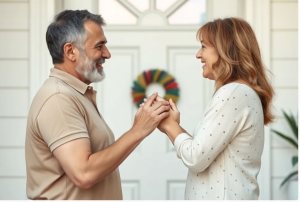This week something remarkable happened—change happened. When a long-present way of feeling or behaving transforms, I view it as a miracle, a gift of grace.
Two months ago, a dear friend, someone I consider family, asked to borrow money. I’m working a lot these days (thankfully) and therefore could provide the help. My friend told me that she would pay me back by the end of February. Before writing her the check, I asked her three questions:
1. Could she, realistically, commit to refunding me by the end of February?
2. Could she repay it without my asking for it?
3. Would she inform me if she was not able to, again, without my having to ask?
Essentially, would she take ownership of the loan she was requesting? Her answers were yes, yes and yes.
Just to know, this is not the first time this friend has asked me for a loan. And, she has not, ever, paid me back when promised. But she does pay me back… eventually. And in case you’re wondering, yes, I do know the problem with doing the same thing over and over again and expecting a different result. But here’s the thing, I didn’t expect a different result, and for many reasons not relevant to this post, I decided to lend her the money anyway.
On the last day of February, I awoke to radio silence: no text, email, phone call or other communication. My friend had not repaid the loan nor contacted me to let me know it wouldn’t happen.
In the past, when confronted with this same situation I would say nothing, at least not for several days, weeks or months. I would sit in resentment, anger, and make-believe okay-ness. Or, find some backhanded way to allude to the unpaid loan but without directly addressing it. Because of my intense fear of what I faced in expressing it—defensiveness, aggression, anger, and attack, a rage on why I was despicable and spiritually bankrupt for wanting and expecting to be re-payed, I would tuck away my truth, my experience of being unpaid, unappreciated, unacknowledged and uninformed. I would disappear, paradoxically, to save myself.
But on this recent occasion, I knew that no matter how frightening the situation, I was being presented with a great opportunity—to practice living from my truth and actually being on my own side. And indeed, I chose to take the opportunity the universe offered, or maybe more appropriately, the universe chose to take me, and lead me somewhere new. It was as if I were extending my hand into the handshake of forward-movement that grace provided.
On that very day, I asked my friend directly if she was going to pay me back and honor the promise she had made—to me.
As expected, she was not going to pay me back, not yet anyway. But the contents of this story are irrelevant. What matters is that I asked my friend for the loan back, on the day it was due. And, that at the moment when my friend would have ordinarily launched into her attack, I stayed still and faced her, eye to eye, to remind her of her promises, and ask her when exactly she would be able to take care of this loan I’d offered. I stood in my own shoes inside the actual moment.
I’m so grateful that my friend didn’t pay me back. It gave me the chance to change, the opportunity to speak up in the face of fear—to choose myself and the truth over the certain conflict it would create and even the possible loss of the relationship altogether. It gave me the chance to practice planting my feet in the truth and trusting that no matter how bumpy the ride, the solid ground of the truth is a place that I will be (and already am) okay.
I write a lot about playing on our own team, expressing and supporting the truth of our experience. In this particular relationship, I would have argued (until recently), that saying nothing and letting it go was taking my own side, because it resulted in keeping the relationship intact, which is what I really wanted and thought I needed. But as time passed, I grew and my heart broke, for itself. It became clear that being on my side, in this way, also required abandoning myself, not speaking up for myself, and even joining my friend’s blaming of me.
Even though I knew, intellectually, that I had rights, nonetheless, after years of being blamed, something in my gut had lost its conviction that I had the right to ask for the money back because I didn’t need it financially. Or, that I had the right to be informed or upset that something I’d been promised was not going to happen. Or, for that matter, the right to be able to trust my friend’s word. I was not on my own side in this relationship, not only because of my fear of the aggression that would come at me in response, but also because of my own handshake with blame, both hers and mine.
Taking the step that is joining our own side, finding the courage to face whatever comes when we speak our truth, is a profound shift in a human being. It doesn’t happen in one fell swoop but rather in little moments and small challenges (that can feel gigantic). In order for this change to happen, we have to have had enough of the suffering that comes with not being on our own side, remaining silent, abandoning ourselves, or accepting blame for having a truth that another person doesn’t like. Our own heart has to break—for ourselves—for what we’ve actually been living, and believing. We have to stop self-blaming and forgive ourselves for needing what we need—for our truth. When this happens, it’s no longer possible to turn our back on ourselves, disappear, in order to keep the peace or status quo.
The moment comes when we say enough, not from our head, but from our deepest guts. We are done, not as an idea but as a profound knowledge.
This process can feel like an act of grace, like something far larger than just our personal self has intervened, offering us the strength and clarity to change how we’re living and who we are. At last, we find ourselves holding our own heart.
Furthermore, the courage to speak our truth involves a shift in allegiance or purpose. Our goal transforms from maintaining the situation/relationship—at all cost—to living from the truth—at all cost. But in order to find this courage, this reverence for and trust in the truth, we have to get okay with anyoutcome that might transpire, including the one we’ve most feared. We must be willing to let it all burn up in the fire of the truth.
To do this, we have to release the belief that the only way to keep ourselves safe, keep our life proceeding as it needs to, is to control our experience and thereby create a certain outcome. It’s a process, really, of turning it over, truth’s will not my will, trusting (or at least being willing to try trusting) that the truth will take us where we need to go, even if it’s not where we think we should be going. At the deepest level, what I’m describing is an experience of awakening and surrender—knowing that we can’t keep abandoning ourselves in the service of taking care of ourselves. And, that it’s safe to let go of the reins, that the truth will take care of us. And ultimately, that the truth is the only real safety we have.


